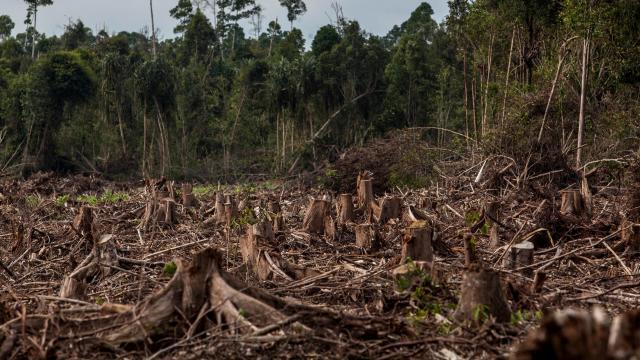New research presents evidence that activities such as deforestation, building palm oil plantations, and even converting grassy areas into new forests are associated with outbreaks of disease, particularly those transmitted by mosquitoes and other vector animals.
The researchers behind the study, published Wednesday in Frontiers in Veterinary Science, looked at different sources of data from 1990 to 2016. This included information on the building of plantations, the loss or gain of forest land, and reported disease outbreaks throughout the world. Then they created a model to see if these events could be connected to one another.
Overall, the global incidence of zoonotic outbreaks — outbreaks that begin with animal-to-human transmission — rose during those years, as did vector-borne outbreaks. The team found a clear link between these activities and more of these diseases, though not always in the same way. In tropical countries where deforestation was more common, the researchers found a correlation to increased outbreaks of diseases like malaria and Ebola. In more temperate countries where afforestation (the practice of converting land into forests) took place, they found a link to increased outbreaks of illness like Lyme disease and scrub typhus, which are spread by ticks and mites.
Other research has shown a relationship between the intentional loss or gain of forests and increased zoonotic outbreaks. But according to the authors, much of this research has focused on individual countries or individual diseases. They say their work is the first attempt to quantify how much of a problem this really is on a global scale.
“We don’t yet know the precise ecological mechanisms at play, but we hypothesize that plantations, such as oil palm, develop at the expense of natural wooded areas, and reforestation is mainly monospecific forest made at the expense of grasslands,” said lead author Serge Morand, an evolutionary ecologist and parasite researcher, in a statement released by the journal’s publisher. “Both land use changes are characterised by loss of biodiversity and these simplified habitats favour animal reservoirs and vectors of diseases.”
While there has been some recent progress in slowing down the rate of deforestation, the loss of forests and their rich biodiversity continues to be immense. Between 2004 and 2017, according to the World Wildlife Fund, the most well-known areas of deforestation in the world have lost more than 43 million hectares of forest — enough to cover the entire country of Morocco. In 2019, tropical forest loss actually increased from the previous year, led by Brazil.
Of course, more diseases that harm humans aren’t the only drawback of these activities. Aside from simply destroying the native environment of countless species, deforestation is thought to accelerate climate change and contribute to the desertification of once-fertile soil. And though there have been attempts to reseed forests, the introduction of forests to places they weren’t before can have its own risks, as this study highlights. Rather than try to build new forests, the authors say, it’s for the best to preserve the ones we have today.
“We hope that these results will help policymakers recognise that forests contribute to a healthy planet and people, and that governing bodies need to avoid afforestation and agricultural conversion of grasslands,” said Morand. “We’d also like to encourage research into how healthy forests regulate diseases, which may help better manage forested and planted areas by considering their multidimensional values for local communities, conservation and mitigation of climate change.”
